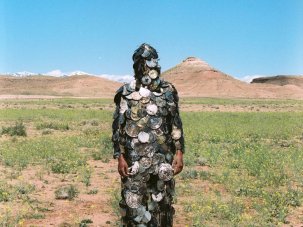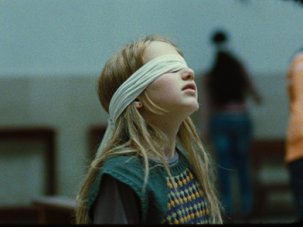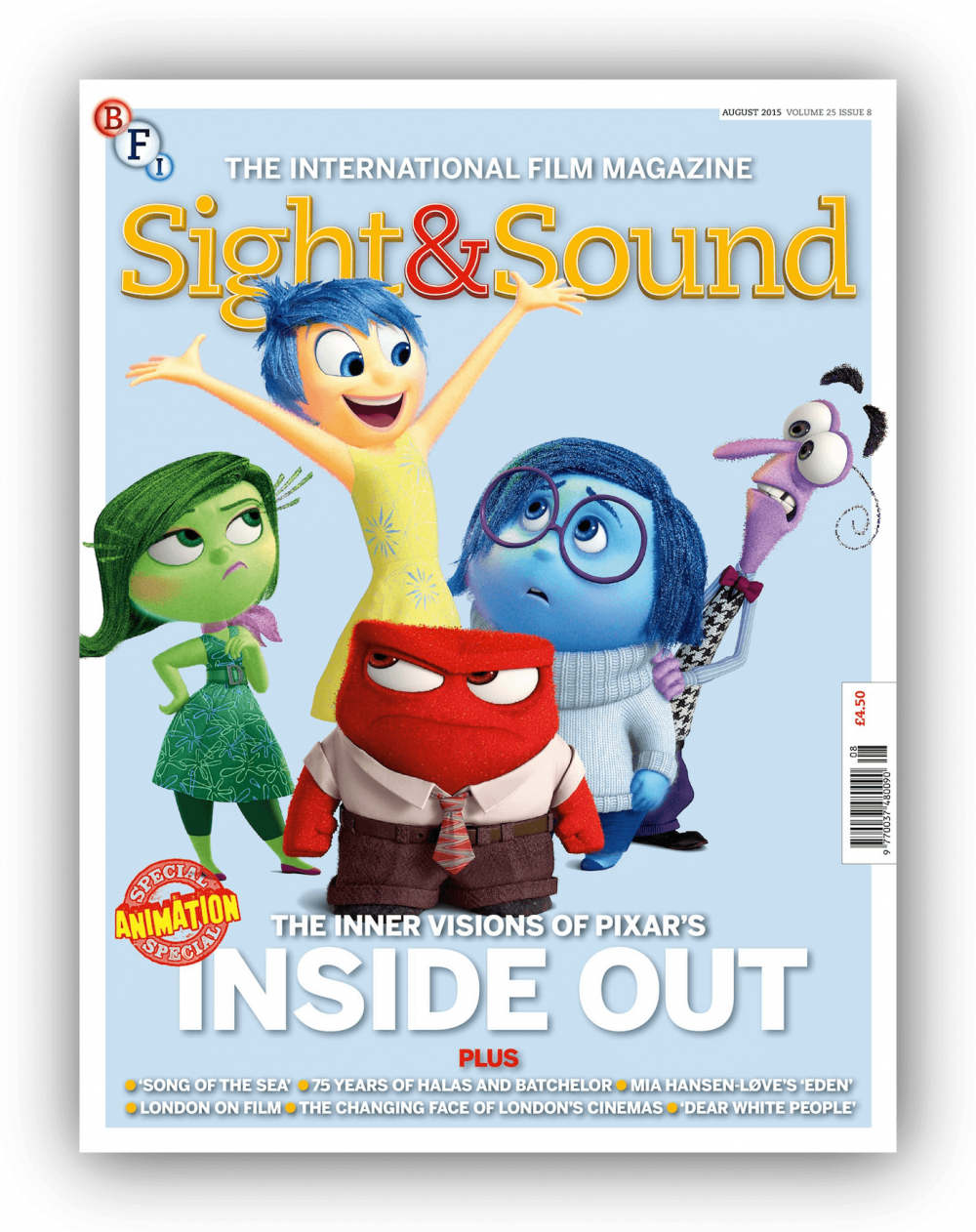
In our animation special we salute four pioneers of the medium past and present. Jonathan Romney explores Pete Docter’s Inside Out and finds Pixar Animation Studios back to their best, crafting nuanced characters and sketching raw sadness and real growing pains in a way they haven’t in quite a while. Over the years Pixar have transported audiences to spaces everyday (toy boxes and restaurants) and extraordinary (clouds and outer space). Docter’s latest mixes the two, journeying into a young girl’s brain. We liked this unusual and inventive investigation of a mental landscape so much that that we made the five emotions who inhabit it our cover stars.
Fêted by Pete Docter and John Lasseter is Irish animator Tomm Moore. Song of the Sea is his second film and on the merits of it and its precursor The Secret of Kells, Trevor Johnston argues Moore’s Irish studio Cartoon Saloon deserves to be ranked alongside Pixar and Studio Ghibli. He talks to Moore about his tale of mythical sea creatures, his reappropriation of Irish folklore and his abstention from Hollywood.
We also celebrate two great animators of the past, John Halas and Joy Batchelor, who founded their company Halas & Batchelor Cartoon Films 75 years ago. Jez Stewart surveys their often precarious existence and looks beyond features like Animal Farm to the short films they were devoted to.
London is the focus of two of our other features. In recent years, swanky upmarket cinemas have appeared across the capital, bringing criticism about the cost of cinema-going today. Edward Lawrenson reports on five vastly different new London movie theatres, from the shiny Picturehouse Central to the community-run Deptford Cinema, exploring their programming choices, funding issues and the challenges they face tempting audiences away from their small screens. Overleaf, Kevin Sampson visits and assesses Manchester’s new five-screen film, theatre and art complex HOME.
Meanwhile, as a season of films about London gets underway at BFI Southbank and gentrification of the capital continues furiously, Danny Leigh takes the opportunity to look back at old and vanishing London through the films set there, taking in the streets, facades and in of films such as Performance, The Long Good Friday, Pressure and many more. How will future filmmakers deal with a city now rendered mostly in faceless glass apartments?
If that wasn’t enough, we also have Frances Morgan talking to Mia Hansen-Løve about her new feature Eden, exploring the French club scene from the early 1990s onwards. And as Justin Simien’s vital comedy Dear White People generates more British media heat than exhibition light, Ashley Clark surveys a distinct tradition of black American film satires that confront race and racism. While we hope this currently under-distributed movie finds more cinema bookings, Ben Roberts revisits the reasons his BFI Film Fund and the major arthouse networks chose not to back it.
In our Rushes section, Mark Cousins, animated by Margaret Sixel’s whiplash cutting work on Mad Max: Fury Road, celebrates an unsung history of female editors. Isabel Stevens visits The Two Eyes Are Not Brothers, Ben Rivers’s new installation in a soon-to-be-demolished London treasure — the BBC’s old Television Centre – and Pasquale Iannone speaks to Alice Rohrwacher about her poetic tale about a beekeeping family, The Wonders.
In Wide Angle, Michael Brooke looks beyond the headline films of Night Train director Jerzy Kawalerowicz, Geeta Dayal listens again to Oskar Sala’s radical score for Hitchcock’s The Birds, Bryony Dixon rediscovers colour silent films, Tony Rayns argues for greater recognition of the epic collage essays of Craig Baldwin – the Bay Area’s gonzo answer to Adam Curtis – and Sukhdev Sandhu meets industrial pioneers Test Dept.
As ever, our Reviews section contains thorough critiques of all this month’s releases, from Albert Maysles’s swansong Iris to Alex Gibney’s Scientology documentary Going Clear. Highlights include Jonathan Romney on Bruno Dumont’s P’tit Quinquin, Violet Lucca on The Wonders, Philip Kemp on the Beach Boys biopic Love & Mercy and Tony Rayns on an exhaustive new collection of Bill Morrison’s phantasmagoric recycling of archive footage.
Our farewell note sees Thomas Doherty analyse the bleakest Hollywood ending of the 1930s, that of Mervyn LeRoy’s I Am a Fugitive from a Chain Gang.
Features
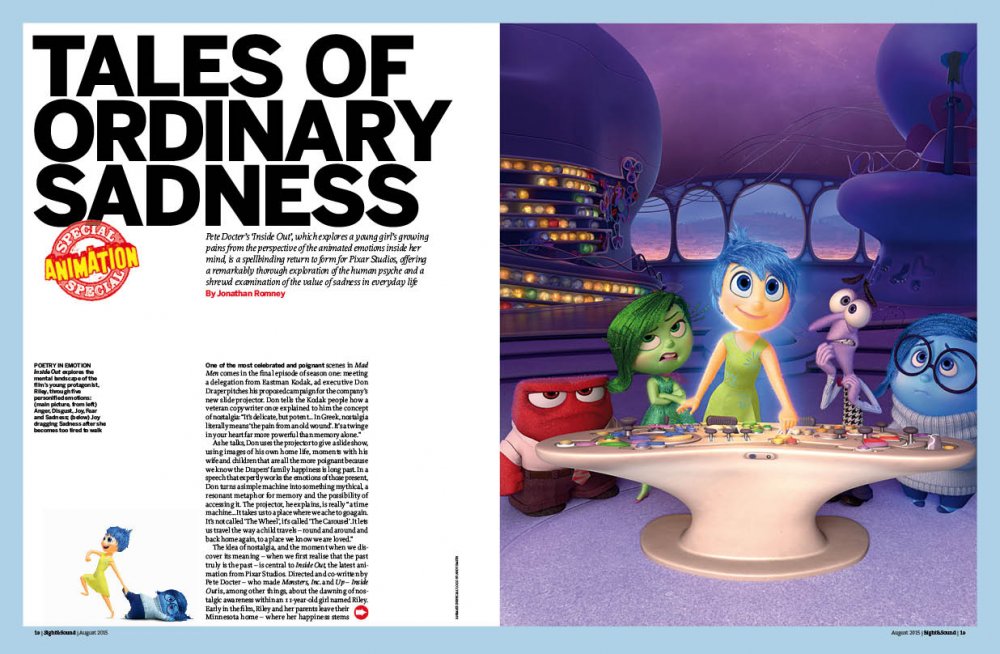
Tales of ordinary sadness
Pete Docter’s Inside Out, which explores a young girl’s growing pains from the perspective of the animated emotions inside her mind, is a spellbinding return to form for Pixar Studios, offering a remarkably thorough exploration of the human psyche and a shrewd examination of the value of sadness in everyday life. By Jonathan Romney.
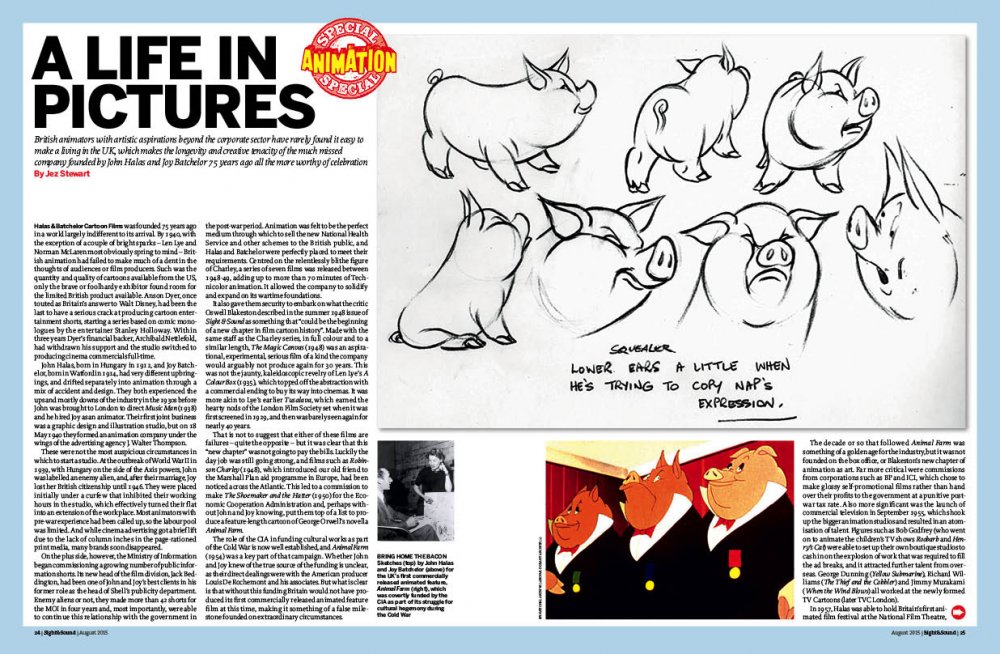
A life in pictures
British animators with artistic aspirations beyond the corporate sector have rarely found it easy to make a living in the UK, which makes the longevity and creative tenacity of the much missed company founded by John Halas and Joy Batchelor 75 years ago all the more worthy of celebration. By Jez Stewart.
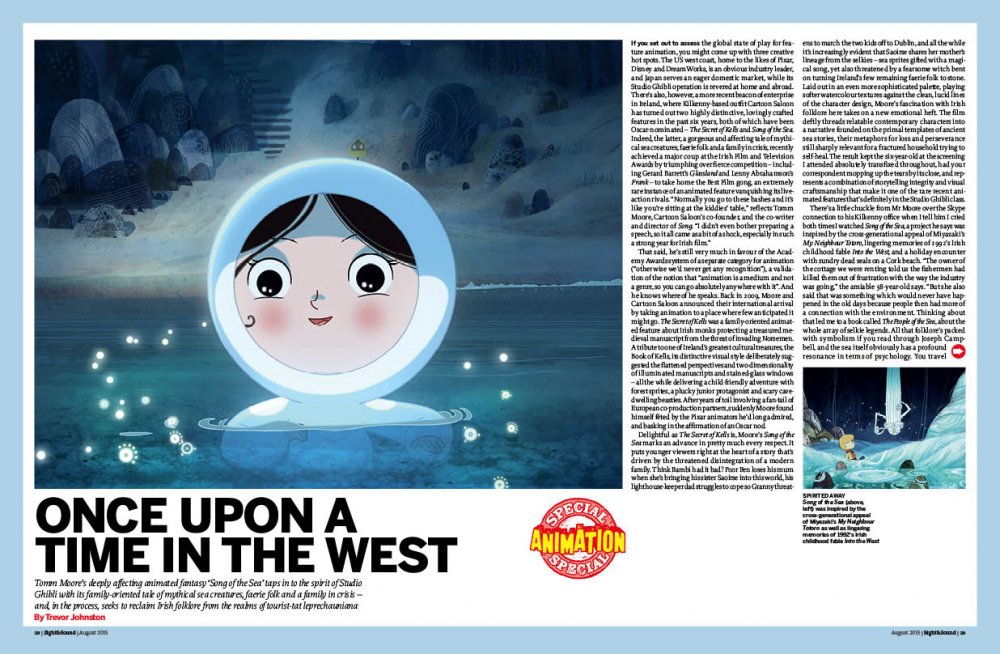
Once upon a time in the west
Tomm Moore’s deeply affecting animated fantasy Song of the Sea taps in to the spirit of Studio Ghibli with its family-oriented tale of mythical sea creatures, faerie folk and a family in crisis – and, in the process, seeks to reclaim Irish folklore from the realms of tourist-tat leprechauniana. By Trevor Johnston.
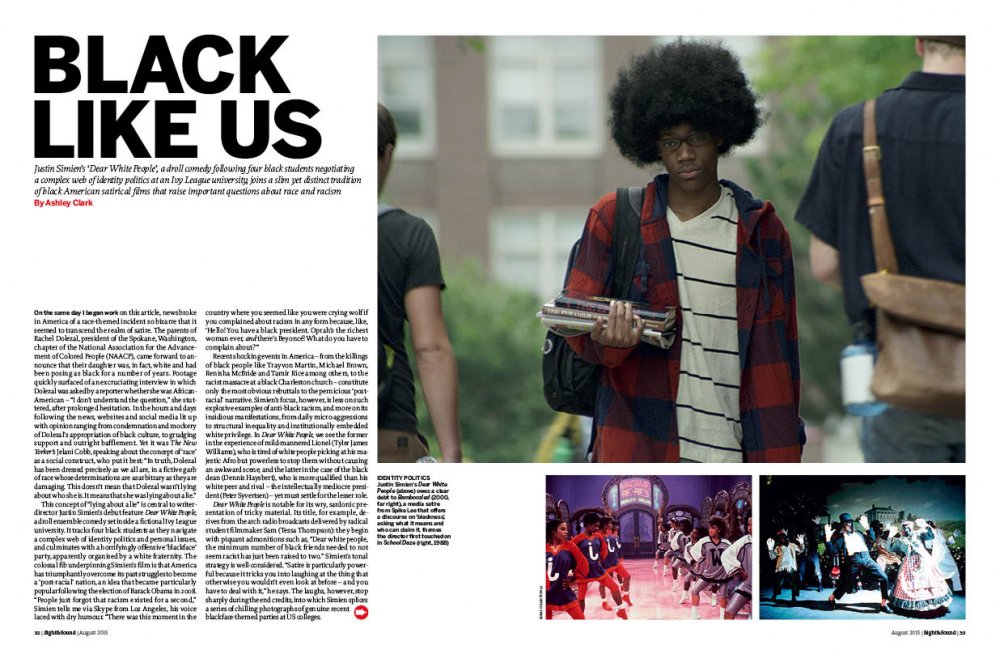
Black like us
Justin Simien’s Dear White People, a droll comedy following four black students negotiating a complex web of identity politics at an Ivy League university, joins a slim yet distinct tradition of black American satirical films that raise important questions about race and racism. By Ashley Clark.
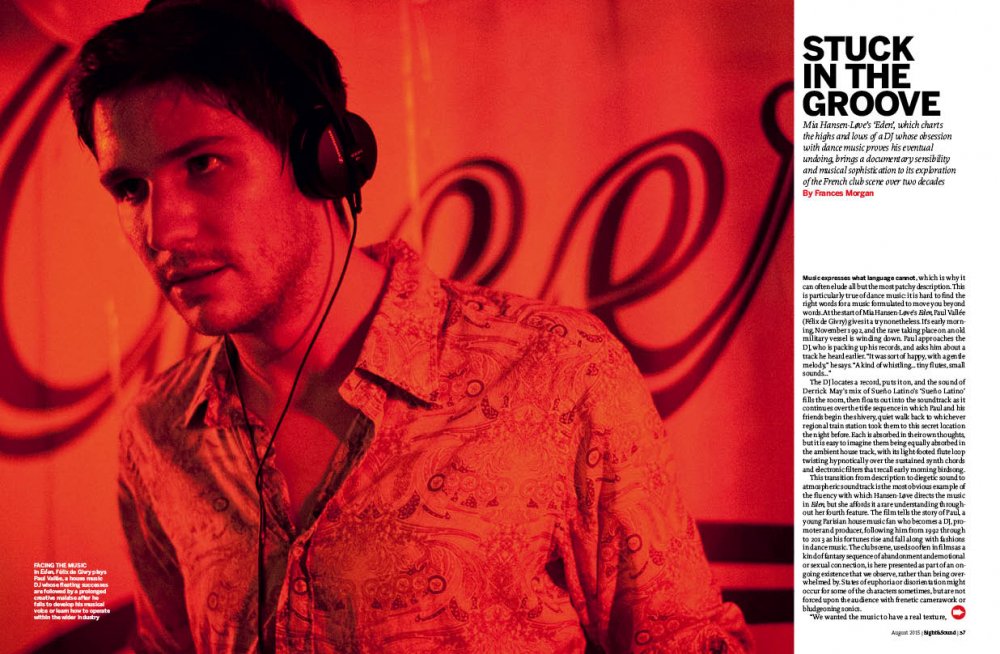
Stuck in the groove
Mia Hansen-Løve’s Eden, which charts the highs and lows of a DJ whose obsession with dance music proves his eventual undoing, brings a documentary sensibility and musical sophistication to its exploration of the French club scene over two decades. By Frances Morgan.
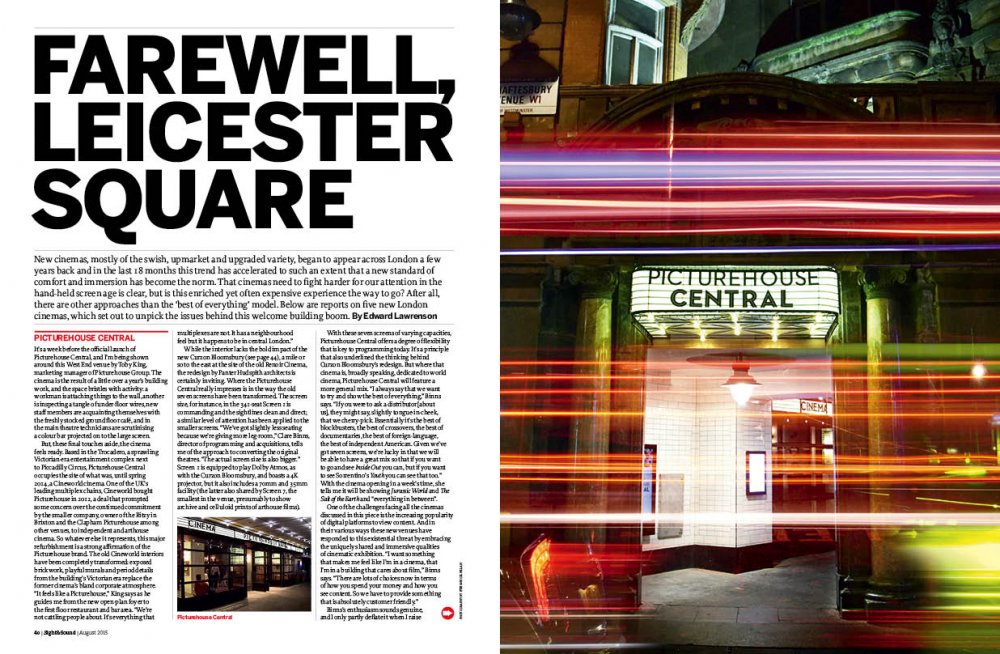
Farewell, Leicester Square
New cinemas, mostly of the swish, upmarket and upgraded variety, began to appear across London a few years back and in the last 18 months this trend has accelerated to such an extent that a new standard of comfort and immersion has become the norm. That cinemas need to fight harder for our attention in the hand-held screen age is clear, but is this enriched yet often expensive experience the way to go? After all, there are other approaches than the ‘best of everything’ model. Edward Lawrenson reports on five new London cinemas, which set out to unpick the issues behind this welcome building boom.
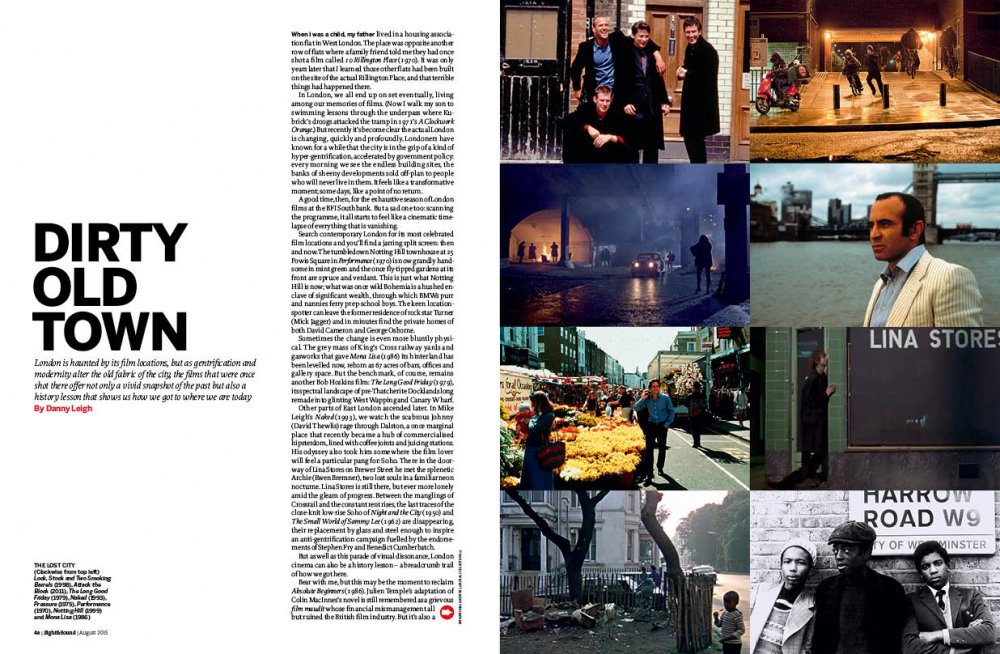
Dirty old town
London is haunted by its film locations, but as gentrification and modernity alter the old fabric of the city, the films that were once shot there offer not only a vivid snapshot of the past but also a history lesson that shows us how we got to where we are today. By Danny Leigh.
Regulars
Editorial
Only the old (and rich)? The new investment élan of London’s central cinemas
Rushes
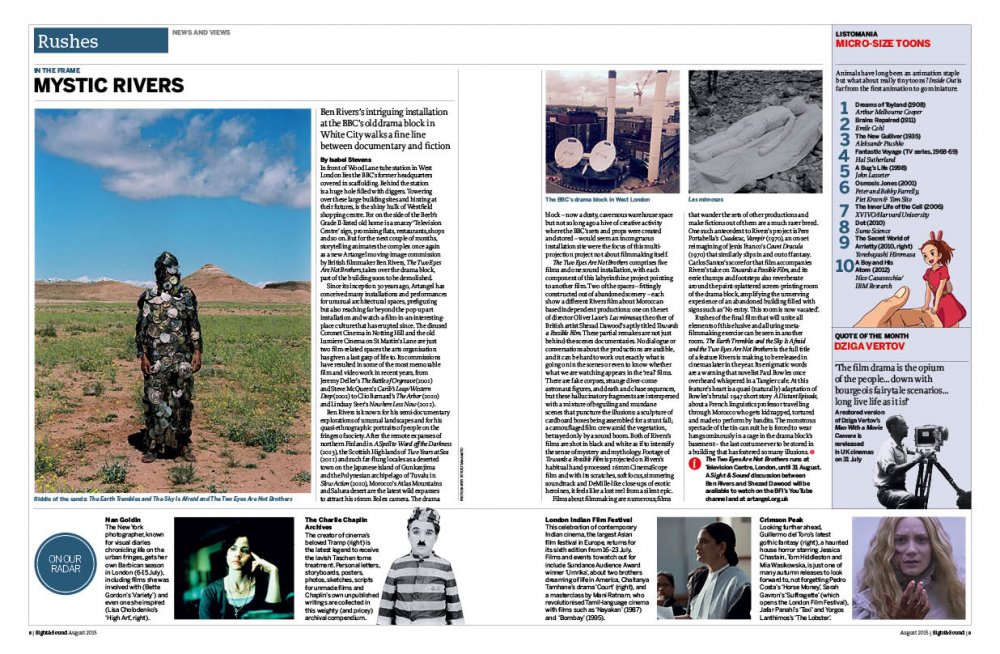
Our Rushes section
In the frame: Mystic rivers
Ben Rivers’s intriguing installation at the BBC’s old drama block in White City walks a fine line between documentary and fiction. By Isabel Stevens.
Listomania: Mirco-size toons
Object lesson: Swimming with sharks
Swimsuits can highlight a character’s fear of exposure and alienation just as much as they can underline their sexual allure. By Hannah McGill.
The five key…: King Hu films
A new DVD of his classic Dragon Inn is a perfect excuse to discover the great Chinese wuxia director’s blend of grace and action. By Anne Billson.
Interview: Land of milk and honey
The Wonders, Alice Rohrwacher’s poetic tale of rural beekeepers, seeks to document the struggles of life in the Italian countryside. By Pasquale Iannone.
Dispatches: Scissor sisters
Given the maleness of the industry, it’s a surprise to realise just how many classic films have been crafted by female editors. By Mark Cousins.
The industry
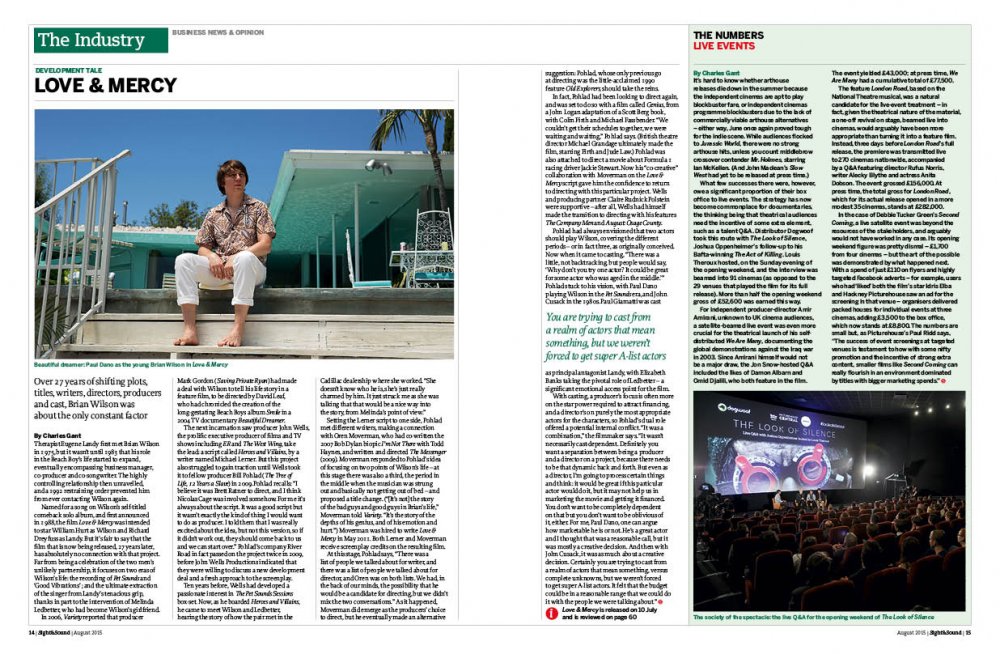
Our Industry section
Development tale: Love & Mercy
Over 27 years of shifting plots, titles, writers, directors, producers and cast, Brian Wilson was about the only constant factor. By Charles Gant.
The numbers: Live events
Brewster: Scream test
The accusations of bias that met the BFI’s decision not to support the theatrical release of Dear White People have given us plenty to digest. By Ben Roberts.
Wide angle
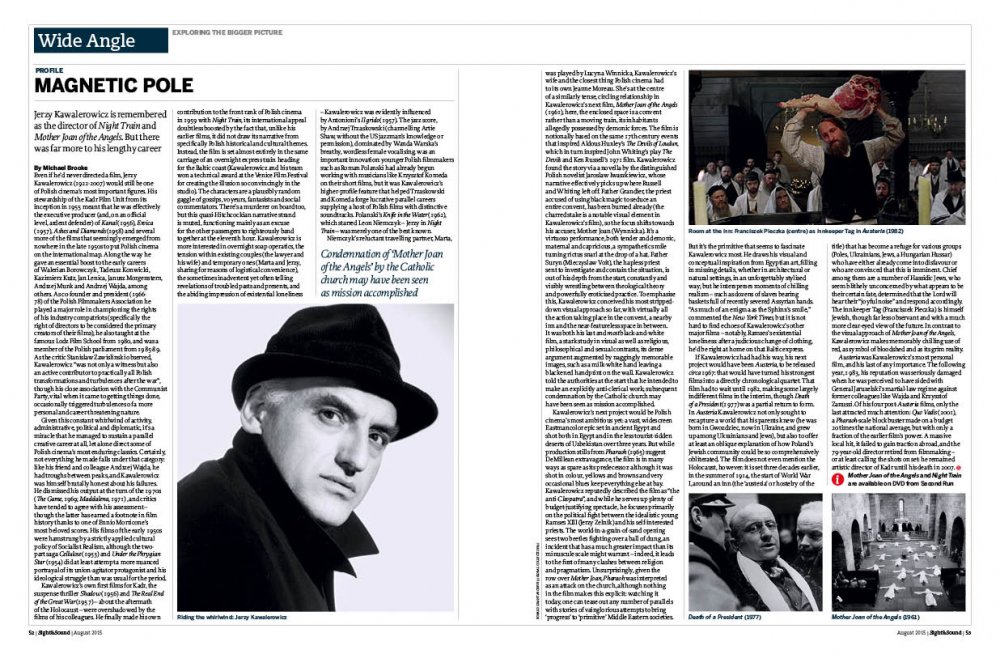
Our Wide Angle section
Profile: Magnetic pole
Jerzy Kawalerowicz is remembered as the director of Night Train and Mother Joan of the Angels. But there was far more to his lengthy career. By Michael Brooke.
Soundings: Synths of the fathers
The Birds was a film about the uncontainable power of nature, but its score was a tightly controlled experiment with artificial sound. By Geeta Dayal.
Primal screen: The world of silent cinema
We used to think that old films were always in black and white. Now we’re rediscovering a colourful past. By Bryony Dixon.
Artists’ moving image: Gonzo collage
Foraging through old film for his materials, Craig Baldwin produces essays and narratives that are both witty and prophetic. By Tony Rayns.
Preview: Industrial action
Thirty years after the Miners’ Strike, industrial pioneers Test Dept are using sound and image to continue the struggle. By Sukhdev Sandhu.
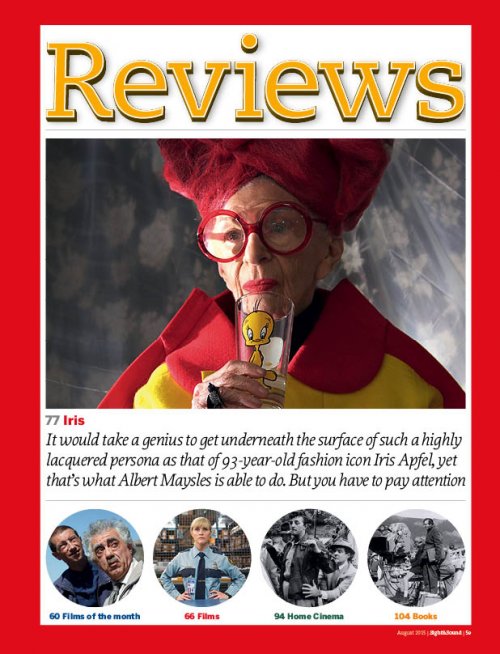
Our Reviews section
Reviews
Films of the month
Love & Mercy
P’tit Quinquin
The Wonders
plus reviews of
Best of Enemies
Beyond the Reach
Born of War
The Burning
The Choir
Cub
Dear White People
Eden
Entourage
Everyone’s Going to Die
Going Clear: Scientology & the Prison of Belief
Hippocrates
Hot Pursuit
The Human Centipede 3 (Final Sequence)
Inside Out
Insidious: Chapter 3
Iris
Jurassic World
The Legend of Barney Thomson
Maggie
Minions
Natural Resistance
1971
The Overnight
Poltergeist
The Reunion
Ruth & Alex
The Salt of the Earth
San Andreas
Search Party
Song of the Sea
Spy
Still the Water
Ted 2
That Sugar Film
13 Minutes
The Wrecking Crew
Wyrmwood
Zarafa
DVD features
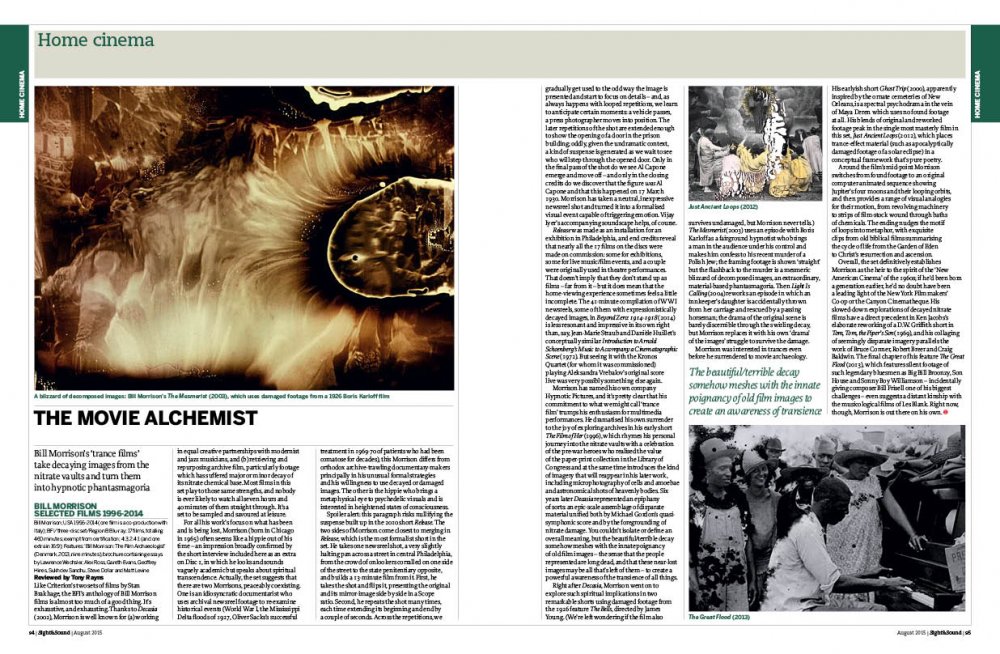
Our Home Cinema section
The movie alchemist: Bill Morrison Selected Films 1996-2014
Bill Morrison’s ‘trance films’ take decaying images from the nitrate vaults and turn them into hypnotic phantasmagoria. By Tony Rayns.
Revival: Kinoshita and World War II
Kinoshita Keisuke’s humane filmmaking instincts were frequently at odds with Japan’s militarised wartime culture. By Alexander Jacoby.
Lost and found: Street Smart
This ingenious anomaly in the Cannon canon is powered by the compelling against-type performances of its two leads. By Naben Ruthnum.
plus reviews of
The Boys in the Band
Films by Costa-Gavras
La danza de la realidad
Drowning by Numbers
Films by Jess Franco
Germany, Pale Mother
The Hound of the Baskervilles
Out of the Clouds
Polish Cinema Classics Volume III
Society
Tell Me Lies
Thunder Road
Television
The Wire: The Complete Series
Your Cheatin’ Heart
Books
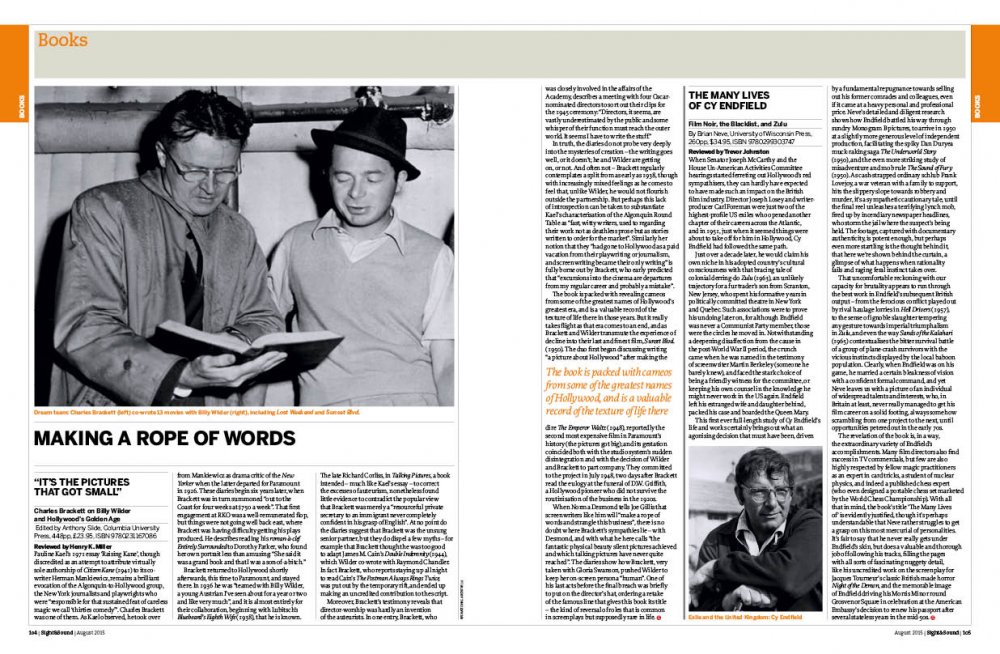
Our Books section
“It’s the Pictures That Got Small”: Charles Brackett on Billy Wilder and Hollywood’s Golden Age edited by Anthony Slide (Columbia University Press) reviewed by Henry K. Miller
The Many Lives of Cy Endfield: Film Noir, the Blacklist, and Zulu by Brian Neve (University of Wisconsin Press reviewed by Trevor Johnston
Lois Weber in Early Hollywood by Shelley Stamp (University of California Press) reviewed by Pamela Hutchinson
Letters
Reckoning on Nicol Williamson
Margaret Tait
Michael Bryant > Sean Connery
Listen Up Philip with damage
Renoir’s Jekyll and Hyde
Documentaries and individual change
Sherlock Holmes’s less expurgated Private Life (in the US)
Michael Curtiz is not Michael Curtis
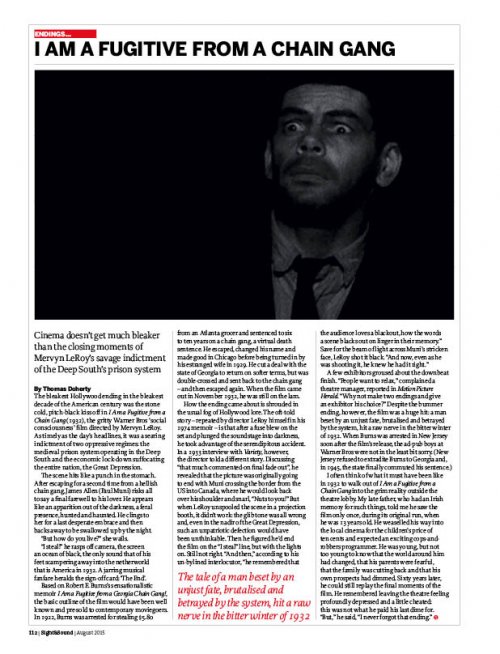
Our Endings section
Endings
I Am a Fugitive from a Chain Gang
Cinema doesn’t get much bleaker than the closing moments of Mervyn LeRoy’s savage indictment of the Deep South’s prison system. By Thomas Doherty.
→
Further reading
-
The Digital Edition and Archive quick link
Log in here to your digital edition and archive subscription, take a look at the packages on offer and buy a subscription.











